- Home
- Taylor Caldwell
The Late Clara Beame Page 2
The Late Clara Beame Read online
Page 2
Laura was no longer playing, and her young face was turned to her husband. “I was just thinking of Aunt Clara,” she said.
“So was I,” Henry told her, laughing. Laura smiled at him. There wasn’t a plane or contour of her face which didn’t seem gentle. She had shimmering dark eyes, large and innocent, and a full mouth. Her hair, the color of sunlight, always surprised people, for it was not in keeping with the darkness of her eyes. People referred to her fondly as ‘little Laura, though she was as tall as Alice Bulowe. But she had an artless, soft way of speaking and a certain shyness. She looked younger than her twenty-six years, and younger than Alice, who was the same age.
“What were you thinking about dear old Aunt Clara?” Henry asked lightly.
“I was just remembering how it was around Christmas, when she was alive,” Laura answered, her voice edged with sadness. “Not that she seemed lovable in any way, to others. But I loved her very much. And I can’t tell even you, darling, what it meant to me to discover, when I was about fourteen, that she loved me, too. I was more grateful for that than for all her money — the fact that she loved me.”
“Apparently she didn’t love Alice,” Henry observed, knocking his pipe against the fender.
Laura frowned. “No. I suppose not. I don’t know why, though, except that, even when we were children, Alice was always so independent and full of pride. And — difficult.” Laura touched a key, then hastily pulled her hand away as the piano gave out a discordant note.
“You still haven’t figured out your relationship to your aunt, if she was your aunt, and Alice and David?” Henry asked curiously.
“Oh, I’ve tried,” Laura admitted. “My father always called her Aunt Clara, but she may have been his grandfather’s niece. I’m almost sure, now, that that is the way it was. And Alice — I think she is really Aunt Clara’s third cousin. I never knew Alice’s parents.”
“You didn’t miss a thing,” her husband told her with fervor. “Her father was hardly ever around home, if you could call that cold-water flat a home. Even when he wasn’t on duty he’d still hang around the firehouse, playing poker and drinking beer. He was off duty when he fell from the roof of that tenement house, and there wasn’t much left for Alice and Dave and their mother. As for Mamma Gates, she hardly made a living in her cheap millinery shop. A fierce kind of woman. I can’t remember her being human.”
“She had to work so hard,” Laura said uneasily.
“My parents did too,” Henry pointed out. “But we managed to get a little fun out of living. And had something to share. We took Alice and Dave in when their mother died of tuberculosis. It was a good thing it wasn’t for long, for otherwise we’d all have starved. Wasn’t Alice about ten when Aunt Clara sent for her to live up here, with you?”
“Yes. We were both ten.” Laura looked absently at the tree, seeing the ghosts of other Christmases. “I always thought it was too bad that Aunt Clara wouldn’t take Dave in too, but he was older, and Aunt Clara never liked boys. Or men.”
And a good thing for all of us too, Henry thought, looking around the room with satisfaction.
“But she sent Dave to that school,” Laura added. “And then to college and medical school. She left him the same amount of money she left Alice, though she’d never let him come here, not once.”
Laura sighed. “Alice and I weren’t ever friends, really. I did admire her so much when we were young. She was always so assured. I used to try to imitate her. I couldn’t. The real reason why Aunt Clara sent us to different schools was because Alice didn’t want me around. But then, I was never as intelligent as she was, and didn’t make friends easily. I suppose she was ashamed of me.”
“Ashamed of you!” Henry said incredulously.
“I don’t know why I even told you,” Laura replied. “But Christmas seems to bring back memories, doesn’t it? I can remember the three of us here around the fire, Aunt Clara, Alice and I. We opened our presents on Christmas Eve. Even Alice laughed then, and she didn’t laugh often.”
“She doesn’t love you much more now,” Henry reminded her, “since she was practically disinherited.”
“I do wish you liked her more,” Laura said, her voice subdued.
“Well,” Henry stated matter of factly, “I can see how she begrudges you everything.”
To his surprise Laura shook her head. “But she doesn’t really, darling! I know. Aunt Clara died when we were nineteen, and Alice had already been working in New York for two months. Neither of us wanted to go on with college.” She stopped, but her dark eyes fixed themselves earnestly on her husband. “I was the ward of Aunt Clara’s bank and lawyers, and they persuaded me to continue my education, though I was an awful student, honestly. Then when I was twenty-one, and just a junior, I stopped.” She hesitated, but her eyes still remained on Henry. “And on the very day I was twenty-one I went to Alice and told her I was going to divide Aunt Clara’s money with her, equally.”
Henry sat up, his face flushed with interest. “Well?” he said, when his wife showed no signs of continuing.
“She absolutely refused,” Laura said in a small voice. “She was very bitter about Aunt Clara, because of the will. ‘If that’s the way she wanted it, that’s the way it’s going to be,’ she told me.”
“But that would have been a million and a half dollars!”
Henry was incredulous. “You actually mean the stupid girl rejected it?”
“Yes. But Alice wasn’t stupid, Henry. She’s just proud.”
Henry shook his head, marveling.
“And then I didn’t know what to do,” Laura went on. “So later I deposited one hundred thousand dollars in Alice’s name, in a bank, and let the bank notify her. She wouldn’t accept that, either. Somehow I thought she’d take the smaller amount. She wrote me a very cold letter, thanking me, and that’s all.”
Henry slapped his knee. “Think of what poor Sam could have done with that money! He’d have bought out that concern, and Alice would be rich now.”
“I don’t think Alice cares a thing about money,” Laura said.
Henry burst out laughing. “Everybody cares about money, Laura.”
“You don’t,” Laura replied tenderly. “You won’t even take any of mine. You let me pay Mrs. Daley and Edith, and buy myself extra clothes, that’s all.”
“I told you, before we were married, that we’d have to live on my salary.” He walked across the room to his wife and ruffled her hair.
Laura buried her face in his sleeve. “Oh, Henry, I can’t help thinking how wonderful it would have been, this Christmas, with the baby in his crib upstairs!” He held her tightly to him. “Now, now. There’s nothing we can do about it. Perhaps next Christmas it’ll be another story. Besides, you’re drawing the line pretty fine. If — if it hadn’t happened, the baby wouldn’t have been born until January or early February. It was bad enough, God knows, but there’s no use pretending that the baby would be upstairs in his crib.”
But Laura still mourned her dead child. “I hadn’t even told you,” she murmured. “I wanted to be absolutely sure. And then I had to play Peter Pan on that swing!”
“You were always swinging in the orchard,” Henry reminded her. “Who could know that the ropes were about to fall apart?”
“I was so excited, that day,” Laura recalled bitterly. “I just had to tell Dave to push me higher and higher! I was almost sure — about the baby. And I was delirious with happiness, but just think how terrible it would have been if you and Dave hadn’t been there then! It was a Sunday, remember.”
“I remember,” her husband said wearily.
“What if it hadn’t been a Sunday, and you had been in the city!”
“Let’s not be too dramatic, darling.”
“You forget,” Laura said quietly. “I was thrown against that tree and kno
cked unconscious. I could have died. Alone.”
Henry remembered that hot Sunday in August vividly, and David running back through the trees to the house to telephone for help. He remembered Laura in his arms, with the blood streaming through her fair hair.
He bent over her now, hugging her to him. “Let’s not go through all that again,” he pleaded. “You promised me you wouldn’t.”
“Oh darling, I didn’t mean to upset you. I promise never to mention it again. Besides, I’ve got something to tell you.” She hesitated. “I’ve been afraid to, before this.”
“What?” her husband asked.
“Now you’re frowning. Please don’t. Well, I’ve talked with my lawyers and executors and I’ve arranged for this house, which you love so much, to be deeded over to you. My Christmas present.”
Henry stepped back. “No!” he said angrily. “I refuse.
Do you hear me, Laura? I refuse. I’ve told you before I wouldn’t allow anything like that!”
“Henry! You really are angry!”
His face was flushed. “Of course I am! It’s bad enough that you have all that money, but I told you, even before we were married, that you weren’t to give me anything out of the ordinary. I thought I impressed you then.”
Laura put her hand on his arm placatingly. “Henry, I didn’t mean — it’s just that you’ve always loved the house. When I die you’ll have it anyway!”
“Oh Laura, for heaven’s sake! I’m ten years older than you are. Women always outlive men. Look at the insurance company statistics.”
“But you knew about my will,” she said, bewildered.
“A will is a different thing,” he told her, exasperated. “I have a will too, for what it’s worth. But I don’t want the deed to this house. If you refuse to understand, I can’t make you. But you must call those lawyers of yours tomorrow.”
“Very well,” she agreed reluctantly. “If you feel that way about it.”
“What a little idiot you are,” her husband told her as he kissed her.
The telephone rang on the table in the hall. Henry straightened up. “Who would be calling at ten o’clock at night?” he asked, as he went to answer it. Laura smiled as she listened to his strong voice speaking.
“It wasn’t Alice telling us she and Dave can’t come after all?” she asked when he returned.
“No. It was a new client, from Baltimore. John Carr. He wants to buy into an advertising concern. Rogers and Belton. I saw him last week and he left the partnership papers with me to go over and change, if necessary. I didn’t think there’d be any hurry about it, but now he’s in a big sweat. So, he’s coming to New York on the twenty-third and we’re to work on the stuff.”
“At Christmas?” Laura asked wonderingly. “What about his family in Baltimore?”
“He hasn’t any,” Henry said. “So he forgets holidays. I hope you won’t mind. I’ve invited him up here for Christmas.”
“A perfect stranger?” Laura was astonished. “At a family Christmas, with Alice and Dave?”
Henry sighed patiently. “I know. It’s ridiculous. He seemed confused when I reminded him it was Christmas. ‘Oh that,’ he said. His exact words. Then he said we must have everything in order so he can put through the partnership before the New Year. What could I do? I promise you we won’t spend all our time locked up in the study. You don’t really mind, do you?”
“Not really,” Laura answered, still surprised. “But I did hope you’d rest over the holidays. And now this.” She hesitated. “What kind of a man is he, and will he fit in with Alice and Dave?”
Henry rubbed his chin thoughtfully. “About my age. The Southern type. Has money; he wants to put seventy-five thousand dollars into the concern. A gentleman, if you’re worried about that.”
Laura brightened. “Is he good-looking?”
“Well, I didn’t look at him with a woman’s eye,” Henry teased. “I suppose so, if you like the lanky, hunt-with-the-hounds Harvard type. He’s all right. I checked with Rogers and Belton. What have you got in mind?”
“Alice,” Laura admitted honestly.
“Oh, no.”
“Why not? After all, it’s just a year. She can’t mourn Sam all the rest of her life, can she?” she asked reasonably.
Henry laughed, then lifted his wife from her seat and swung her up into his arms.
“What makes you think Alice mourns Sam?” he asked. “I think it was a blessing when he killed himself.”
Chapter 3
The snow had stopped during the night. But by ten o’clock the following morning it had begun again, this time with blizzard force growing wilder by the hour. The wind of the night before was now a whistling gale, slamming against the ancient walls of the big stone house. It howled in the chimneys and rushed across the frozen earth, bursting upwards into white, swirling fountains. It sounded to Laura as though endless freight trains were screaming overhead.
At noon she listened worriedly to the news and weather broadcasts. The announcer stated jovially that the East was definitely “in the grip of one of the worst blizzards.” A white Christmas was predicted, so he amusingly advised housewives to look over their supply of candles. Laura listened to the warm hum of the furnaces. What if the lines did go down? The furnaces would stop. Would Alice and David, and the new guest, John Carr, enjoy being isolated? Alice and David were certainly not the cozy type. Impatient and restless by nature, they would resent enforced seclusion. They liked to walk and explore. Laura looked gloomily at the windows shrouded with snow, her mind on the stranger from Baltimore. What would John Carr think of the white isolation of a really formidable storm? This, thought Laura, but without much hope, might be an interesting experience for him. On the other hand, what if he were a bore, and restless too? Advertising men, she had discovered, could be volatile.
Alice, of course, knew these storms. She had always hated them; they frightened her. Orderly and indifferent by nature, she preferred things to be smooth and under control.
The storm had darkened the day. Laura had had to turn on lights. At three o’clock their handyman, who doubled in everything, would have to drive to the station to pick up Alice and David. Would he forget the chains? He was both indifferent and incompetent and he usually did. She would have to check. As she listened to the wind she remembered that this was only the 22nd of December. John Carr was not due until tomorrow. Perhaps he would not be able to come. It was doubtful whether Henry would even be able to go to New York tomorrow to see him. Laura found herself wondering if Christmas would be bright or not. Alice and David rarely liked people. If they didn’t like John Carr, and showed it in a cruel way, then the whole holiday would be a disaster.
“I hope,” Laura was shocked to hear herself say, “that David and Alice can’t come either!” Why had she invited them? Pity for Alice, in her small apartment in New York? Hope that Alice might eventually come to like her and realize that she had had no part in influencing Aunt Clara’s will?
“You are too dependent on others,” Henry had often told her. “It’s all right to be dependent on me. That’s the way it should be. But others! Why should you care?” That was all very well for Henry, who knew everyone in the township and liked them and who was liked in return. But she was afraid of people, their frank way of looking her in the eye. She felt certain that they thought her weak. Sometimes it was agony for her to join her husband in New York for one of his business dinners and to meet strangers. She knew they thought her pretty — at first. But later they appeared to forget her very existence, and she would sit silently for the rest of the dreary hours, yearning for home. Often they even forgot to say goodbye to her, not out of malice but simply because they had entirely overlooked her. She often wished that she could make a good impression because it would be valuable for Henry.
When she had been a small child, after her
father had remarried his first wife and had gone away with her and his first two children, she had languished in a miserable boarding school in New Jersey, where the tiny rooms were always cold and dank, the food almost unedible, the teachers poorly paid and listless. She had received only three letters from her father. She remembered him quite clearly, though as a silent, gray-colored man who had once been a successful lawyer like Henry. But that was when Mama had been alive, Mama who was lively and beautiful and bouncing with fun. Aunt Clara, the soul of propriety and severity, had, amazingly enough, loved the pretty Lucille, who had been a chorus girl in a nightclub. And she had insisted that the young dancer have the child in her home. And, Laura remembered fondly, Mama used to make Aunt Clara laugh, often by dancing some of her abandoned dances right in this house! It seemed incredible to Laura that she had watched her mother actually perform something perilously close to a strip tease — here in the huge, staid sitting room!
Bertram Beame had remained horrified and unforgiving. Was it because his wife had ‘made a spectacle of herself’ before Aunt Clara? Or was it because he had come to regret his incongruous marriage and to fail in his profession? There had been the large alimony payments to his first wife, and she had refused to divorce him unless she received nearly two thirds of his income. “A cold, mean stick of a woman. Always detested her,” Aunt Clara had once remarked. “Greedy. Like a starved harpy. No wonder Bertram finally got rid of her.”
Laura could remember her father’s misery, his lost look, his silence. What had made him give up a woman like his first wife, who was surely more suitable for him, to marry laughing, dancing Mama? Infatuation? “Middle-aged funk,” Aunt Clara had once said, abruptly. “Never blamed him.” Surely, by her very nature, Aunt Clara had been closer in character to the first wife. Yet, she had loved vivacious, radiant Mama. She had even given her some of her old but valuable jewelry. Where was it now? Sold for living expenses?

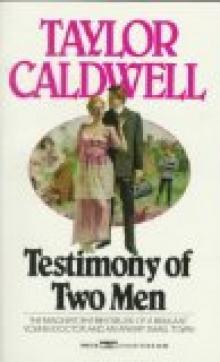 Testimony of Two Men
Testimony of Two Men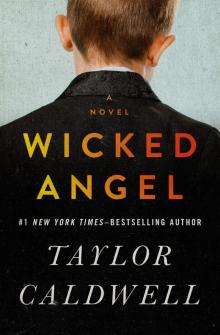 Wicked Angel
Wicked Angel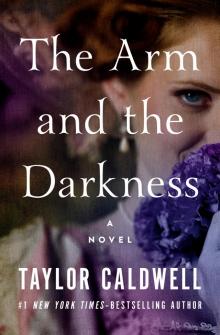 The Arm and the Darkness
The Arm and the Darkness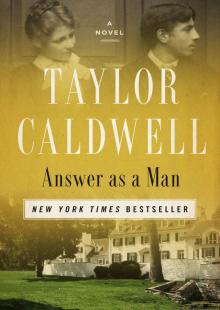 Answer as a Man
Answer as a Man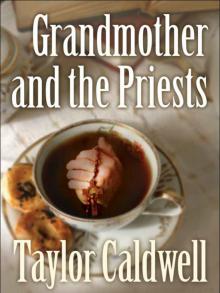 Grandmother and the Priests
Grandmother and the Priests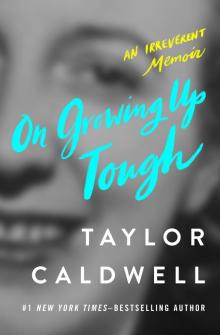 On Growing Up Tough: An Irreverent Memoir
On Growing Up Tough: An Irreverent Memoir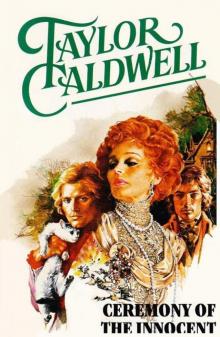 Ceremony of the Innocent
Ceremony of the Innocent The Listener
The Listener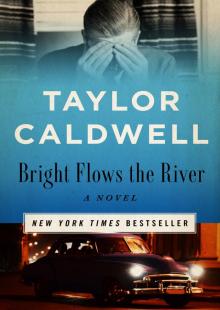 Bright Flows the River
Bright Flows the River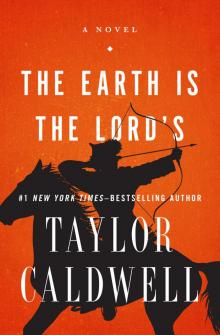 The Earth Is the Lord's
The Earth Is the Lord's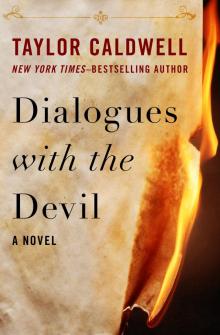 Dialogues With the Devil
Dialogues With the Devil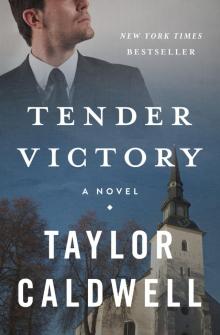 A Tender Victory
A Tender Victory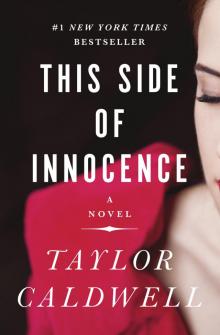 This Side of Innocence
This Side of Innocence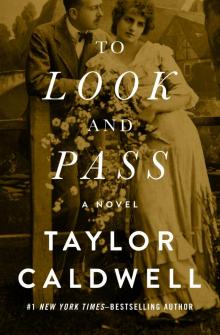 To Look and Pass
To Look and Pass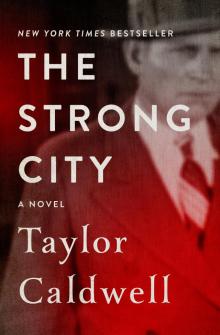 The Strong City
The Strong City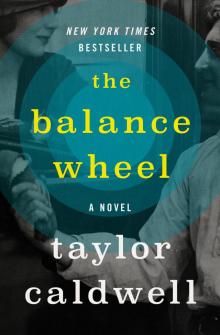 Balance Wheel
Balance Wheel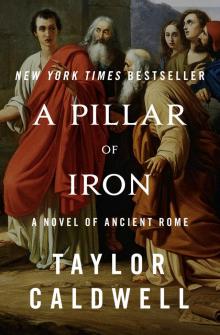 A Pillar of Iron: A Novel of Ancient Rome
A Pillar of Iron: A Novel of Ancient Rome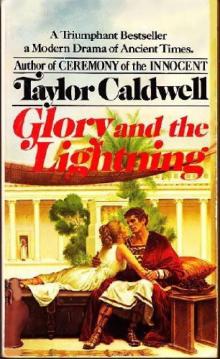 Glory and the Lightning
Glory and the Lightning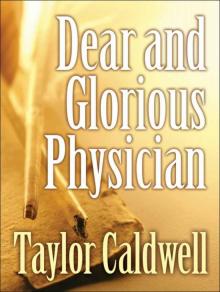 Dear and Glorious Physician
Dear and Glorious Physician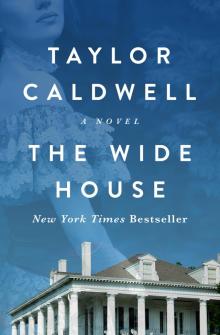 The Wide House
The Wide House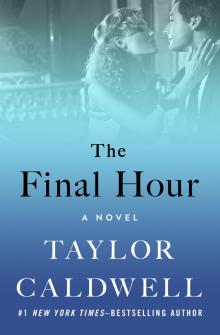 The Final Hour
The Final Hour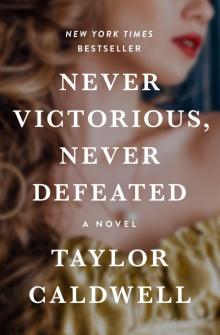 Never Victorious, Never Defeated
Never Victorious, Never Defeated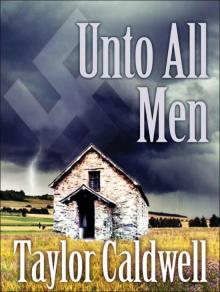 Unto All Men
Unto All Men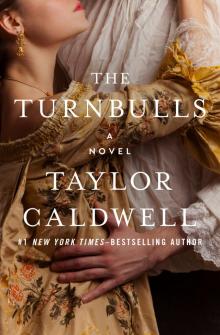 The Turnbulls
The Turnbulls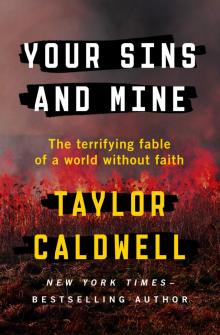 Your Sins and Mine: The Terrifying Fable of a World Without Faith
Your Sins and Mine: The Terrifying Fable of a World Without Faith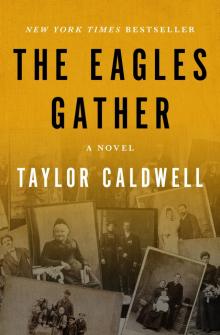 The Eagles Gather
The Eagles Gather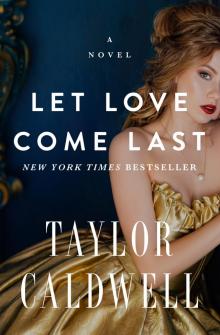 Let Love Come Last
Let Love Come Last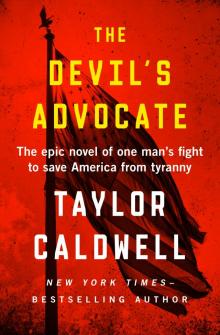 The Devil's Advocate: The Epic Novel of One Man's Fight to Save America From Tyranny
The Devil's Advocate: The Epic Novel of One Man's Fight to Save America From Tyranny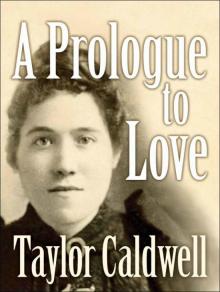 A Prologue to Love
A Prologue to Love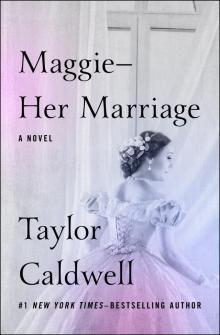 Maggie: Her Marriage
Maggie: Her Marriage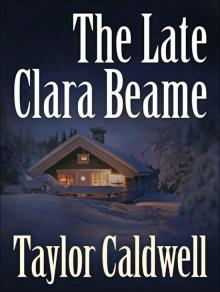 The Late Clara Beame
The Late Clara Beame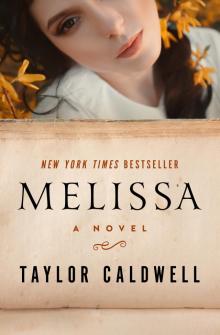 Melissa
Melissa Great Lion of God
Great Lion of God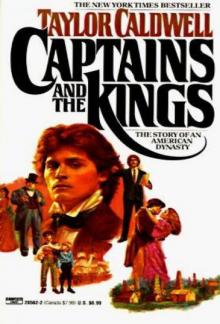 Captains and the Kings
Captains and the Kings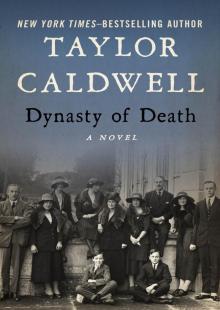 Dynasty of Death
Dynasty of Death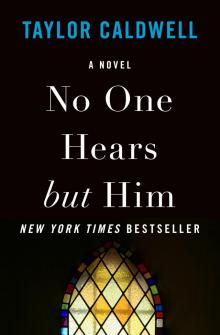 No One Hears but Him
No One Hears but Him The Sound of Thunder
The Sound of Thunder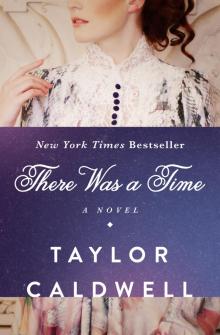 There Was a Time
There Was a Time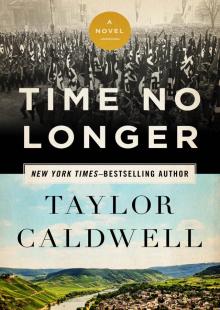 Time No Longer
Time No Longer I, Judas
I, Judas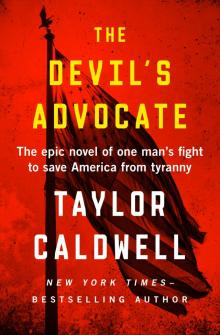 The Devil's Advocate
The Devil's Advocate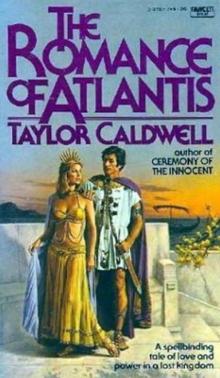 The Romance of Atlantis
The Romance of Atlantis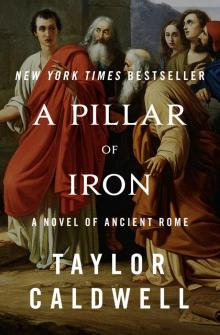 A Pillar of Iron
A Pillar of Iron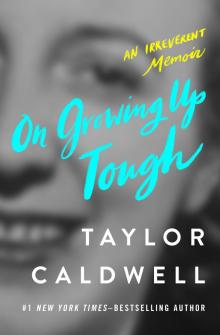 On Growing Up Tough
On Growing Up Tough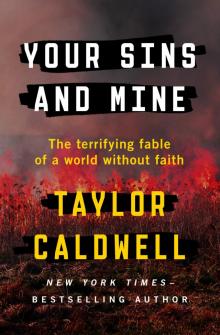 Your Sins and Mine
Your Sins and Mine